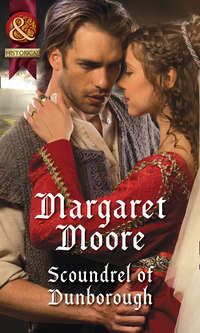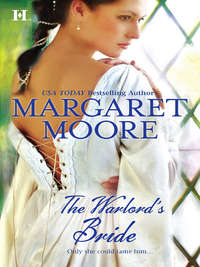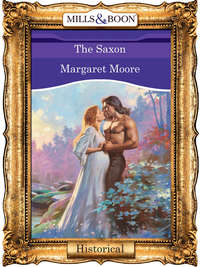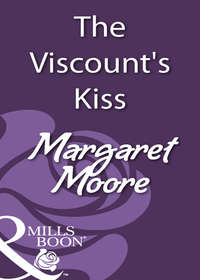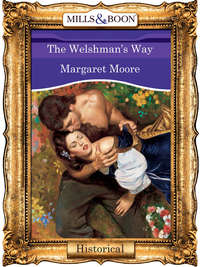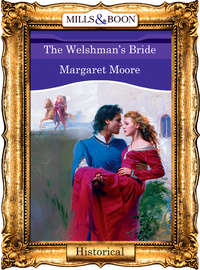
Полная версия
The Notorious Knight
Her hair was a dull brown, straight, and drawn back tightly from her heart-shaped face. There were no charming little curls, no cunning little wisps escaping to give a man the opportunity for a surreptitious caress under the guise of tucking in a stray one. Lady Gillian’s nose was a pert little button, and a splash of freckles crossed the bridge and dotted her cheeks, marring her complexion. To be sure, her green eyes were bright and vibrant, but they weren’t particularly alluring. She was too thin, too, even though her breasts were full and round and her hips had a certain seductive sway when she walked…far too quickly.
“My conquests have been greatly exaggerated,” he reminded his squire. “And I assure you, that servant’s too young for me.”
His lips curved up into a wry little smile. “I’m not particularly fond of red hair, either.”
As his squire grinned with relief and set to work unpacking, Bayard inwardly, and sourly, added, “Nor am I fond of shrews.”
BAYARD WAS PLEASED TO NOTE that despite Lady Gillian’s less-than-enthusiastic reception, she’d had the courtesy to give him the seat to her right at the evening meal.
The jealous steward sat on her left-hand side. Frederic was on Bayard’s right, as was the priest, a Father Matthew who ate as if he’d been fasting for days. His own soldiers were seated immediately below the dais with the garrison commander and more of Averette’s men.
The food was good, thank God. Since he had to stay here, he was grateful for that as he speared another piece of veal dressed with vinegar with his eating knife. Meanwhile, his hostess continued to ignore him and talk to the steward.
Lady Gillian had rather nice hands, he noticed, although they were browned by the sun. Ladies were supposed to sit inside doing nothing more strenuous than sewing or, if they were particularly active, engaging in a hunt, wearing gloves. If they went outside, they were supposed to sit demurely in the shade. Clearly she did little that other ladies did, or in the way they did it.
Determined to concentrate on something other than the chatelaine of Averette, Bayard studied the hall and the soldiers gathered there. The garrison appeared well trained, as far as mustering in the yard went, anyway. It remained to be seen how good they’d be in battle or during a siege.
“Oh, not again!” Lady Gillian suddenly—and loudly—exclaimed.
When Bayard turned to look at her, she was regarding the steward with dismay, although there was laughter lurking in her eyes.
“It’s true, I’m afraid,” Dunstan replied, shaking his head and smiling. “He’s charged Geoffrey with false measuring again. I truly think Felton would rise from his death bed if he thought he could shame Geoffrey.”
Lady Gillian laughed—an amazing, throaty, hearty laugh completely unlike the decorous little titters most ladies made in company. It was the sort of laugh one might hear in bed after a joyous bout of lovemaking, a laugh to make a man want to laugh, too, and he was astonished at the difference it made to Lady Gillian’s appearance. She looked years younger, and prettier.
Her full lips were very appealing, he realized, especially the charming dent in the top of her upper lip, and he was suddenly tempted to touch it. With his tongue.
Which was ridiculous. The journey here, so soon after his return from Normandy, must have been more taxing than he thought.
“Will there never be an end to this squabbling?” Lady Gillian asked when she stopped laughing. “Father Matthew, can you not speak to them? This feuding must cease!”
“Alas, my lady, I have tried,” the priest replied, “but they will not turn the other cheek.”
“There’s a feud?” Frederic asked eagerly, despite the arrival of baked apples—his favorite—for the final course.
“It’s a conflict of long, long standing,” she said, smiling at the lad.
Bayard wished she’d smiled that way at him when they’d first arrived. If she had, he would have been slower to take offense at her manner and swifter to forgive and forget the lack of a kiss of greeting.
Not that he regretted reminding her about that. Although at the time she’d held no great attraction for him, he’d been acutely aware of the sensation of her warm breath on his cheek and the knowledge that her body was a hair’s breadth from his own. Now, after hearing her delightful laugh and seeing her lovely smile—
“How did the feud start? An insult?” Frederic asked interrupting Bayard’s musing as the red-haired serving maid set down the spiced apple before him.
“A woman,” Lady Gillian replied. “The miller and the baker both wanted to marry the same one, and she chose the miller.”
“Ahh!” Frederic cried, giving Bayard a knowing grin.
Bayard clenched his jaw and stayed silent. He wasn’t going to say a word about jealous men, or women making choices, or anything to do with marriage.
“The baker brings a charge of false measure against the miller every hall moot, or so it seems,” the steward explained. “In two days’ time, they’ll stand before us again, arguing.”
That got Bayard’s full attention. “You’re having a hall moot?”
“Yes, in two days,” the lady answered as if he were dim.
“I don’t think that would be wise.”
Her brows lowered. “Why not?”
“Because it’s too public, and puts you in danger.”
“It’s to be held in my courtyard,” she protested. “Surely I’ll be perfectly safe there.”
“I don’t think so,” Bayard firmly replied. “An assassin could easily slip in with the villagers. It only takes one well-aimed arrow or knife throw to kill.”
Lady Gillian shook her head and spoke with most unfeminine certainty. “The hall moot cannot be delayed. The people have been expecting it. There are several quarrels to be decided and fines to be assessed.”
“I can appreciate that you require income, but your safety must come first.”
Her green eyes flashed with stubborn determination. “Hall moots are necessary for the peace of the estate. What can begin as a small disagreement, easily dealt with in a hall moot, can become much more serious if left to fester.”
She raised her pointed chin and got a remarkably defiant expression on her face. “I am still in command of Averette, am I not? If I am—and unless you know for certain I’m in immediate danger—the hall moot will be held as planned.”
“I’m sure she’ll be perfectly safe, Bayard,” Frederic seconded, although nobody had asked him. “You’re an even better swordsman than your brother.” He looked past Bayard to Lady Gillian. “He told you about the trial, didn’t he? That Lord Armand won?”
The lady frowned. “Sir Bayard has said nothing about a trial.”
Frederic grinned from ear to ear, looking more like an excited puppy than ever. “He’s too modest to brag about his brother, but you should be very proud of your brother-in-law, Lord Armand, my lady. It was an amazing victory.”
“I would never have suspected modesty to be one of Sir Bayard’s virtues,” Lady Gillian remarked.
Bayard’s grip tightened around the stem of the goblet. She had to be one of the most aggravating women in England. “I saw no need to speak of it,” he said, “since Armand was proven innocent and the real traitor exposed.”
“The man who has wed Lady Adelaide, was accused of treason?” the steward asked as if that was the most disturbing thing he’d ever heard in his life.
“Falsely accused and proven innocent,” Bayard said, wishing Frederic had kept quiet about Armand’s recent troubles, especially since everyone else in the hall had fallen silent, as well they might.
The lady abruptly rose from her chair. “I was planning to announce this at the hall moot,” she said in a clear voice that easily reached the far end of the hall, “but the news has already been revealed here tonight. I have recently been informed that my sister, Lady Adelaide, may have wed Lord Armand de Boisbaston.”
As Lady Gillian’s servants and soldiers exchanged surprised looks, a murmur of wonder, disbelief, and excitement filled the hall. Over by the door leading to the kitchen corridor, the red-haired maidservant and another young woman whispered behind their hands, and so did several others seated at the tables or standing in clusters around the hall.
“This knight, Sir Bayard de Boisbaston, is his brother.”
Another mutter went through the hall, this time less excited and more suspicious. Bayard’s own men shifted uncomfortably, aware of the sudden tension in the hall. It was as if an ill wind had blown through, chilling all it touched except Bayard, who smiled as if all was well with the world, and he was delighted to find himself related to this termagant.
“I’m sure some of you fear that there will be a new lord of Averette,” Lady Gillian continued, balling her napkin in her hand. “That is not so. Lady Adelaide has given me her word Averette will always be mine to govern. She assures me this is still so, despite her marriage.”
However odd that might be, Bayard thought grimly.
A collective sigh filled the hall. Apparently the men of Averette didn’t share his reservations about having a woman in command of a castle.
Perhaps it was different here because of what Armand had told him about the late lord of Averette. Lady Gillian’s father had been vicious, cruel and unjust. Under those circumstances, perhaps any new lord would be met with dread and suspicion. Nevertheless, and despite the evidence of his own eyes—for seeing Armand and Adelaide together, no one could doubt but that they were deeply in love—Bayard still couldn’t accept that Armand was willing to leave this castle and estate in a woman’s control. To be sure, Lady Gillian was not the most feminine female he’d ever encountered, but she was still a woman.
“Now, my lord,” she said, returning to her seat and turning the full force of her vibrant green eyes onto him, “tell me about this trial.”
Since Bayard had no choice but to answer, he did, repeating the bare facts. “My half brother was falsely accused of treason and proved his innocence in a trial by combat against one of the men who denounced him to the king.”
“I’ll say he proved it!” Frederic cried, fairly bouncing in his chair. “He ran his sword right through Sir Francis’s face!”
The lady gasped, the priest paled, and the steward looked rather queasy.
“That was the traitor’s choice,” Bayard explained, not wanting them to think Armand was some kind of savage. “Francis ran into Armand’s sword rather than suffer a slow execution.”
“I wish I’d seen it!” Frederic exclaimed.
“A true knight takes no pleasure in death, however it comes about,” Bayard said swiftly, and sincerely. “When he has a duty to do, he does it, but he should never relish the taking of a life.”
He turned back to Lady Gillian, whose face bore an expression he couldn’t quite decipher. But he didn’t care what she thought. He’d had enough of her unladylike demeanor and behavior, her envious steward, her orders and refusals.
“If you’ll excuse me, my lady,” he said, getting to his feet, “it’s been a long day, so I’ll give you good night.”
No doubt just as happy to see the last of him for the day, she regally inclined her head. “Good night, Sir Bayard.”
“May I stay?” Frederic asked.
Since he didn’t require his squire’s help to prepare for bed, Bayard nodded. Then he bid his men a restful night and marched from the hall.
WHILE SUPPOSEDLY LISTENING to Dunstan relate the cases expected to come before for judgment at the hall moot, Gillian watched Sir Bayard cross the hall with long, purposeful strides. He paused to have a word or exchange greetings with his men, and they replied with seemingly genuine good humor, as if he were their friend as well as commander.
Interesting, and quite different from Iain’s method of command. He would no sooner jest with his men than he’d strip naked in the courtyard.
Sir Bayard would likely be only too willing to do such a thing if he lost a wager or for some other silly reason. With such a body he’d probably be glad to.
She could just imagine him standing there, smiling with arrogant vanity, taking off his clothing one piece at a time…
“My lady?” Dunstan said, laying his hand on her arm. “Did you hear me?”
As embarrassed as if Dunstan had read her thoughts, she swiftly pulled away. “Yes. If the chandler’s daughter wishes to marry the cooper’s son, I have no objections.”
Unable to prevent a blush, she took a drink of wine while Dunstan slowly and deliberately folded his hands upon his lap.
Chapter Four
THE NEXT DAY, GILLIAN ROSE from her seat at the table in the solar where she’d been reviewing the tithe rolls and lists of foodstuffs she’d recently purchased. She had to be aware of estate income and expenses, but sitting and staring at rows of figures was not how she preferred to spend her time.
Walking to the window, she looked out over the land she loved—the fields, meadows and woods, the village, and especially the people she cared about as if they were her family. She could see the mill and its wheel slowly turning, suggesting a peace she knew was absent from the miller’s household. Boats plied the river, and on the banks, several women did their washing, spreading their linen on bushes to dry and bleach in the sun. A few children swam a short distance away, splashing each other, their shouts and laughter inaudible above the bustle of the servants, and wagons, and merchants delivering goods in the yard below.
Smoke rose from the smithy in gray wisps and she could easily imagine Old Davy holding court with his fellows, talking about the news of the day, speculating about what the king might do next to try to retrieve his lands in France, and what he might tax to raise the money to do it.
She could see the open space of the green, and the wagons of some peddlers drawn up there, no doubt to the chagrin of those merchants whose stalls bordered the green. In the yard belonging to the widowed alewife, the cooper was unloading barrels. She was likely complaining, albeit in a good-natured way, about the price he’d charged her to make them. When he was finished, they’d probably retire to her brewery and sample her latest, then finish the day in bed together, for it was no secret that their relationship went beyond the bounds of business.
If she were to marry, Gillian reflected, she’d have to leave her home, and her friends, and the people she cherished to go to her husband’s estate. She would be a stranger among strangers, and surely very lonely.
Even when James was alive and they’d talked of a life together, she’d been troubled by that possibility.
To think it had been less than a year since her father’s death and she’d become the chatelaine of Averette, with Adelaide’s blessing and promise that it would always be so. Less than a year since Adelaide had gone to court. Less than a year since Lizette had gone north to visit friends and make more, for as Gillian never wanted to leave Averette, Lizette hated the notion of being tied to one place.
Would a man like Sir Bayard ever understand how she felt about her home and her desire to ensure that everyone here was safe and secure, at least as much as she could? That she would forego the things women were supposed to crave—a husband and even the joy of children—to make it so? And that she didn’t want to be under the power of any man?
Probably not. Indeed, she could easily imagine his disbelief and scorn if he ever learned of her vow never to marry, and that she had taken it willingly—nay, eagerly, since James had died.
“My lady?”
She turned to find Dunstan, dressed as usual in a long, dark tunic, standing on the threshold with a parchment in his hand. He wasn’t alone, however. There was a man standing beside him whom she’d never seen before. He was about the same age as Dunstan, and well dressed. He was well groomed, too, except for his rather unkempt beard.
“My lady, this is Charles de Fenelon,” Dunstan said as he stepped into the room. “He’s a wine merchant from London, with most excellent wares.”
Judging by his clothes, the merchant’s business must be a prosperous one. She guessed from the slight scent of wine about Dunstan that he’d recently tasted samples of some of the aforementioned wares.
“It’s a pleasure to meet you, my lady,” de Fenelon said with a bow and an ingratiating smile. “I’ve heard nothing but praise of you in the town.”
Dunstan, who knew how she felt about flattery, held out a small scroll. “Here’s a list of his prices.”
As she took it, their hands touched for a moment. Trying to ignore the unwelcome sensation, she moved toward the window.
“Our stores are rather low,” Dunstan noted. “Of course, we wouldn’t need so much wine if our guests would take their leave.”
Gillian wasn’t pleased that Dunstan had said such a thing in front of the merchant, but she wasn’t going to chastise her steward, not when she knew that more than concern for the wine stores had prompted his remark. He was jealous of Sir Bayard, although he had no reason to be. She didn’t care about Sir Bayard that way.
But neither did she harbor any desire for Dunstan.
She’d always thought of him as a brother, for his gentle, kindly father had been the steward here before him. Recently, however, and much to her dismay, she’d realized Dunstan’s feelings for her had changed into something more than brotherly affection. Unfortunately, while she could be blunt and direct about many things, she couldn’t bring herself to speak to Dunstan about his feelings for her, or tell him that she did not, and never would, reciprocate them.
Instead, she hoped the difference in their rank would prevent him from speaking to her of love. She was, after all, a lord’s daughter and he the untitled son of a Norman knight’s bastard. Although that difference didn’t influence either her affection or her trust in him, many would tell him to look for love elsewhere because of that alone. There were plenty of young women of lesser rank in and around Averette who would gladly consider marriage to the kind-hearted, competent steward.
But not her.
Focusing on the list, she read it quickly and said to de Fenelon, “Your prices seem a bit high.”
His face fell. “That is the best I can do, if I’m to make any profit at all.”
He probably thought that because she was a woman, he could play on her sympathy and thus charge her more. “We shall either take them at the prices you have written here, or not at all.”
“Very well, my lady,” he agreed, thankfully without trying to haggle.
Because his prices were satisfactory, she said, “If your wine is as good as Dunstan claims, we’ll be happy to do business with you again.”
“Thank you, my lady,” Charles replied, beaming with delight.
“Charles knows Sir Bayard de Boisbaston,” Dunstan said with a significant look.
“Not personally,” Charles added hastily. “I sell wine to many of the nobles who are friends of the king and his court.”
“Then you’ve seen him?” Gillian asked, trying not to betray any overt interest to de Fenelon.
She would also prefer that this wine merchant, whom she’d never met before, not be privy to any suspicions they might have about their supposedly noble guest.
“Many times, most recently when I came through your hall. He’s playing chess with a young man your steward says is his squire.”
So that knight really was who he claimed to be.
Gillian walked to her chair and slowly lowered herself onto it. That made it more likely that the letter she’d received was really from Adelaide, too, and therefore everything in it was true, as well.
If so, Adelaide had broken her vow and married, and Lord Armand de Boisbaston could be the master of Aver-ette. Therefore, and regardless of whatever Adelaide had promised, Gillian had no legal right to govern Averette. Lord Armand did, if he would lay claim to the estate.
God help her, he could take command of Averette and do whatever he liked. He could even send her away.
Dunstan cleared his throat and she realized the wine merchant was still there, watching her. She wanted to tell him to go, and Dunstan, too. She wanted to weep, and rant, and wail, but she managed to control that impulse.
Dunstan took a step closer and clasped his long fingers together, shaking his hands to emphasize his point as he always did when he had something important to say. “Unfortunately, my lady, there’s more. Charles tells me Sir Bayard is notorious for his seductions, and is a coward, as well. He’s reputed to have seduced over fifty women at court, and he surrendered the castle he was charged to hold in Normandy after a siege of less than a week. They also say he seduced his captor’s young wife.”
Gillian’s eyes narrowed. Sir Bayard didn’t appear to be a coward, but how could one tell that except in battle? As for being a lustful rogue…he was handsome enough that she could believe he would be successful at seduction. Her maidservants certainly acted like addle-pated ninnies when he was nearby.
On the other hand, he hadn’t behaved like some of the lustful noblemen who’d come to Averette claiming to be interested only in the lord’s daughters while chasing every serving wench who crossed their paths.
If the merchant was merely repeating gossip, she knew how little faith she should have in his information. Adelaide had once told her some of the stories being spread about the ladies of Averette. “Is that so, Charles?”
“I’m sorry to say it is, my lady,” the wine merchant reluctantly replied. “At court, they call him the ’Gyp-tian lover because he travels from bed to bed, stealing women’s hearts.”
That shouldn’t surprise or disappoint her; what did she know of Sir Bayard de Boisbaston, after all? But she was disappointed nonetheless—perhaps because there was a chance she was related to him by marriage.
“His squire’s also putting it about that Sir Bayard once came upon a troubador entertaining some ladies before a tourney,” Dunstan said. “The troubador, aware of Sir Bayard’s alleged prowess in the melee, asked him to reward his song with a horse. Sir Bayard agreed, spotted an approaching knight, immediately unhorsed the fellow and returned to present the singer with the horse before his song was done.”
Gillian had heard this story before, but not about Sir Bayard de Boisbaston. “The Earl of Pembroke did that.”
“So at the very least, the man takes credit he doesn’t deserve,” Dunstan averred.
If this was true, Sir Bayard did not sound like a man she wished to be related to. She wondered if Adelaide knew what he was like—or if she really knew the man she’d married, either. The wedding had apparently happened with rather remarkable haste.
“Are you likewise familiar with his brother, Lord Armand de Boisbaston?” she asked Charles.
“Indeed, my lady,” he replied with more confidence. “What happened to him at Marchant was a bad business. The king should have sent reinforcements.”
Instantly wondering why Charles felt he could criticize the king to her, she said, “It’s not for us to question the king’s actions.”
“No, no, certainly not,” Charles quickly replied. “I was only thinking of Lord Armand’s unfortunate capture.”
He gave her another obsequious smile. “His luck has certainly changed since he returned. The very day he arrived at court, he won your sister’s heart.”
Had it really happened as quickly as that? Or was this another tale embellished in the repeating?
“I see that beauty runs in your family, my lady.”
It was all Gillian could do not to roll her eyes. She was no beauty and never would be. Adelaide and Lizette took after their poor, pretty mother. She looked like her father’s late sister. “The image of that ugly sow Ermentrude,” he would shout at her.
Dunstan shifted his weight from his right foot to his left, drawing her attention. “Perhaps, my lady, you should—”
She rose before he could offer her advice, or try to tell her what to do. She already knew what that would be—that Sir Bayard should go.


